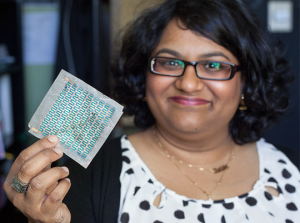Round Table with Prof. Trisha Andrew

WICTO had the pleasure to host a round table with Dr. Trisha Andrew, an assistant professor of Chemistry and Materials Engineering at the University of Massachusetts Amherst. Not only did the participants learn about Andrew’s journey to a career in science, but also tips about starting a career in academia. Below are a few snippets of the conversation we had with Andrew:
What brought Andrew to a career in science?
From a young age, Andrews’ parents espoused the mentality that she should have a career (as a doctor) and were very supportive Andrews’ activities. Her parents empowered her to shape the trajectory of her future career and not be reliant on others in her financial well-being.
Did Andrew know from a young age that she wanted to be a scientist?
As to her interests, she was “a nerdy child.” She approached her favorite chemistry teacher in high school, asking if he needed any help. She was ecstatic to be given the task of updating the inventory of the chemical stock room, being surrounded by so many different chemicals. Now overseeing her own lab, she chuckles at this memory, because she recognizes the onerous nature of this task. However, through this menial activity, she spotted her teacher’s organic chemistry textbook. She started going through the entire organic textbook on her own. Her passion for the subject allowed her an internship opportunity at the Hutchinson Research Center in Seattle, WA during her final year of high school. During this time she realized she loved the tactile part of scientific research.
Did she ever change her career path?
When she started her studies at the University of Washington, she was still interested in pursuing medicine. To this end, she joined a biology lab where undergraduate students were hired to harvest eggs from drosophila. A tedious and repetitive task, it required her to individually dissect the flies for hours on end. After countless decapitations, the flies started appearing in Andrew’s nightmares. She decided she didn’t want to become a doctor, so she phoned her mother and gave her the news. Her mother was accepting of Andrew’s decision. Andrew, surprised, asked why her parents only suggested a career in health for her (instead of engineering or finance, for instance). Simply put, they chose a career to stimulate Andrew to do well in school, and through random chance, they decided on medicine. Since Andrew had to finish the semester working with flies, she joined a chemical engineering lab. This new lab became the foundation for her graduate studies.
How did Andrew transition to her new lab as a PhD student?
Andrew completed her PhD under Tim Swager at MIT. She says that she was lucky to not be confronted with a major situation to overcome while researching in this environment. While she didn’t have a close relationship with her supervisor, she was very grateful he gave her the independence to answer the research questions that she wanted to answer. She jokingly recounted the only qualm of her graduate studies was her research usually didn’t end up in her advisor’s research talks. Since she was able to do her own thing, she started a collaboration with another graduate student and they were published in Science without her PI.
How did Andrew decide on her next steps after receiving her PhD?
She wanted to be a research faculty member, so felt it necessary to attain a postdoctoral fellowship. She knew immediately she wanted to work for Vladimir Bulovic after listening to his talk on the how to make solar energy more accessible to the general public. Andrew was completely blown away by his suggestion: changing the material that holds the solar panel. For homeowners in climates that are under heavy snowfall, the largest inconvenience of the solar panel isn’t the panel itself, but modifying the roofs to support the extra weight of the panels. She was amazed how Bulovic opened a new field of study by looking at the problem in a different angle. Her postdoc advisor made her think about problems in very different ways. Even now he keeps her on her toes. Recently, he suggested that the cloth her lab has developed can be used to harvest and store solar energy without being part of the electrical grid. This idea came to him while thinking of ways to solve the difficulties in Puerto Rico after Hurricane Maria devastated the major portion of the power infrastructure. Her response, “Goddammit, why didn’t I think of that?”
How does Andrew view fundamental vs application-based scientific funding for the progression and sustainability of science?
She believes there should be a healthy balance between researchers who do fundamental research and researchers who develop technology to be applied in other fields or be commercially available. When researchers are dependent on industry, such as Kent State University’s Liquid Crystal Institute, they cannot devolve away to the developing technologies when they desire.
How was the transition to faculty member?
Andrew was thankful for her mentoring committee at the University of Wisconsin-Madison. Her vocal committee members resolved issues she faced as a new faculty member. She recommends new faculty join institutions with a good history of mentoring committees. Although these committees are helping new faculty members, there is still much to be improved upon. Make sure the faculty have the right to choose and change their committee members, because the members are the advocates of the faculty.
What does Andrew suggest to aspiring faculty members?
When it comes to the interview, you don’t really understand how it works until you have become a professor. “Self-promote like crazy.” This is the time for applicants to show off. She has been disappointed when qualified people focus on citing the correct people instead of presenting the new ideas they want to research as a faculty member. Andrew suggests researching the people you’d likely meet. For example, know their scientific “tribe.” As part of the interview process, use the time spent with people assessing whether you would have compatible work personalities. When Andrew completed her first interviews, she aimed to seem engaged and passionate in the subject.
What does Andrew suggest for new faculty searching for students?
“Never say no, but know who you work best with.” Andrew says she is compatible with “wild pony crazy people,” but will note that sometimes you do need to reign them in (pun intended). She also recommends taking chances on people, because new professors don’t have as many options. One of her most beloved students belonged to two separate labs before approaching Andrew. She noticed the previous frictions in the other labs arose from the independent nature of the grad student and Andrew saw a little bit of herself in the student. She does not regret this decision as the student started most of the current major projects in Andrew’s lab.
Should faculty members let graduate students be more independent, because it was very formative in your career?
It depends on the problem they are trying to attack. Successful groups in biology have less freedom, partly cost related, than chemistry research groups. Andrews’s lab focuses on broad questions, which allows for a broader range of projects. She suggests to ask the research question correctly: does the research need to be very focused or is there wiggle room? Research definitely changes scope over the course of a professor’s career.
